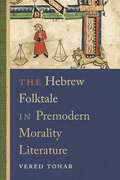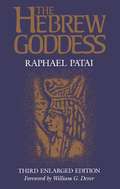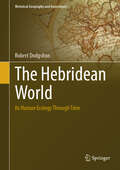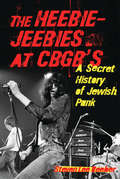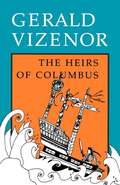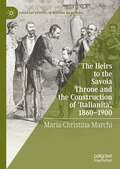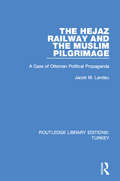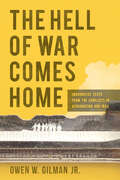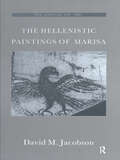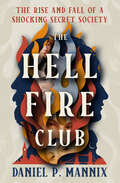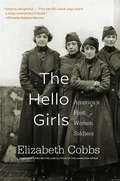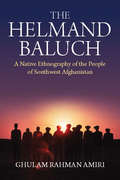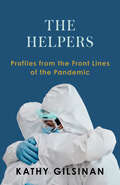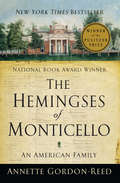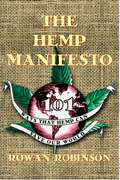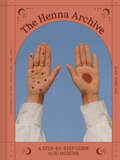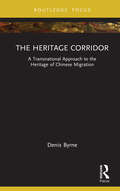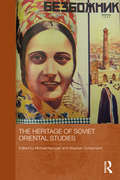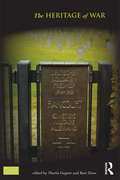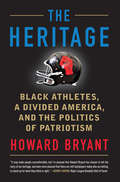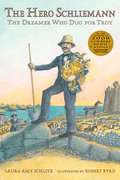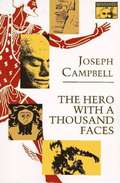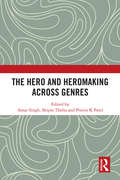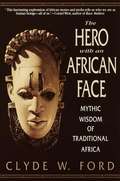- Table View
- List View
The Hebrew Folktale in Premodern Morality Literature (Raphael Patai Series in Jewish Folklore and Anthropology)
by Vered ToharThis pioneering exploration shows that in the early modern world, printed works on morality and ethics served as an important conveyor of classic Jewish folktales and as an important channel of leisure reading in premodern Jewish culture. Utilizing a corpus of over 400 Musar tales, author Vered Tohar carefully opens a path to understand the thematic and poetic features of those tales. This innovative reframing of early modern Musar texts reveals a new history of Jewish folklore and emphasizes the continuity of Hebrew literature from medieval to modern era. Tohar classifies these stories, which she calls "the Musar folktales," into four genres adapted from classic poetic studies: tragedy, comedy, parable or social exemplum, and theological allegory. As parables of vice and virtue, the works featured here were originally printed and circulated in early modern Jewish communities, and each contained themes of love and hate, good and evil, loyalty and betrayal, or life and death. Beyond their traditional function of ethical and moral edification, Tohar advances the Musar texts as an archive of Hebrew tales and their ideological traditions. This innovative reframing of early modern Musar texts reveals a new history of Jewish folklore and a new way to read those texts.
The Hebrew Goddess
by Raphael Patai William G. DeverThe Hebrew Goddess demonstrates that the Jewish religion, far from being pure monotheism, contained from earliest times strong polytheistic elements, chief of which was the cult of the mother goddess. Lucidly written and richly illustrated, this third edition contains new chapters of the Shekhina.
The Hebridean World: Its Human Ecology Through Time (Historical Geography and Geosciences)
by Robert DodgshonThe Hebrides has long been seen as an area that, when considered over time, was slow to absorb change. Indeed, from the nineteenth century onwards, it attracted the attention of scholars for being seen as having not just the oldest rocks in Europe but also, some of its oldest cultural practices and institutional forms. This unchanging ‘archaic’ character has continued to attract a great deal of research but, over recent decades, a counter view has emerged that highlights the changes that the region did experience. This book argues the case for the latter by drawing out how the institutional forms around which the region and its farming communities were organised changed over time. As background. It highlights the importance of understanding two key inter-related features that underpinned these changes: the low output of Hebridean farming with its high frequency of poor harvests and the range of environmental hazards that beset the region. Brought together, the interaction between these two features makes the survival strategies adopted by communities an important part of the region’s history. Because society/environment interactions are at the heart of the problem, the book’s discussion is presented as a study in human ecology. One of the benchmark studies of the region in modern times, or Sir Fraser Darling’s The West Highland Problem: A Study in Human Ecology (OUP, 1955) adopted such an approach. This book gives this human ecological perspective on the region a greater time-depth. In addition to a Preface and an Epilogue, it is divided into 12 chapters: Title: The Hebridean World: Its Ecological History Through Time Preface 1: The Hebrides: Their Physical Endowment and Its Challenges 2: The Oldest Cultural Landscapes 3: The Hebridean Mix: Picts, Scots and Vikings 4: How Land was Occupied Before Crofting 5: How the Land was Farmed before Crofting 6: Landscapes of Summer: the Shielings 7: The Inter Tidal and Beyond: the Harvest of Shore and Sea 8:Survival on the Margins 9: The Landscapes of Crofting 10: The Harvesting and Processing of Grain 11: The Clearances for Sheep and Deer 12: Hebridean Housing and Settlement Epilogue
The Heebie-Jeebies at CBGB's: A Secret History of Jewish Punk
by Steven BeeberBased in part on the recent interviews with more than 125 people --among them Tommy Ramone, Chris Stein (Blondie), Lenny Kaye (Patti Smith Group), Hilly Kristal (CBGBs owner), and John Zorn--this book focuses on punk's beginnings in New York City to show that punk was the most Jewish of rock movements, in both makeup and attitude. As it originated in Manhattan's Lower East Side in the early 1970s, punk rock was the apotheosis of a Jewish cultural tradition that found its ultimate expression in the generation born after the Holocaust. Beginning with Lenny Bruce, "the patron saint of punk," and following pre-punk progenitors such as Lou Reed, Jonathan Richman, Suicide, and the Dictators, this fascinating mixture of biography, cultural studies, and musical analysis delves into the lives of these and other Jewish punks--including Richard Hell and Joey Ramone--to create a fascinating historical overview of the scene. Reflecting the irony, romanticism, and, above all, the humor of the Jewish experience, this tale of changing Jewish identity in America reveals the conscious and unconscious forces that drove New York Jewish rockers to reinvent themselves--and popular music.
The Heirs of Columbus
by Gerald Vizenor"If you must read a book on Columbus," declared the Los Angeles Times in its review of The Heirs of Columbus, "this is the one." Gerald Vizenor's novel reclaims the story of Chrisopher Columbus on behalf of Native Americans by declaring the explorer himself to be a descendent of early Mayans and follows the adventures of his modern-day, mixedblood heirs as they create a fantastic tribal nation.The genetic heirs of Christopher Columbus meet annually at the Stone Tavern at the headwaters of the Mississippi to remember their "stories in the blood" and plan their tribal nation. They are inspired by the late-night talk radio discourses of Stone Columbus, a trickster healer who became rich as the captain of the sovereign bingo barge Santa Maria Casino, anchored in the international waters of the Lake of the Woods. The heirs' plan to reclaim their heritage enrages the government and inspires the tribal nations in a comic tale of mythic proportions.Vizenor is a mixedblood Chippewa who writes fiction in the trickster mode of Native American tradition, using humor to challenge received ideas and subvert the status quo. In The Heirs of Columbus he "reveals not only how Indians have staved off the tidal wave of assimilation," noted the San Francisco Chronicle, "but also how, through humor and persistence, they sometimes reverse the direction of cultural appropriation and, in the process, transform the alien values imposed on them.""Vizenor understands the wilder, irrational, half-mad parts of the Discoverer's soul as few people ever have," noted Kirkpatrick Sale in the Nation; "Columbus is appropriated here in an entirely new way, made to be an Indian in service to his Indian descendents." And the Voice Literary Supplement said "Even more rousing than Vizenor's deconstruction of Columbus, though, is his alternative vision of an American identity."
The Heirs to the Savoia Throne and the Construction of ‘Italianità’, 1860-1900 (Palgrave Studies in Modern Monarchy)
by Maria Christina MarchiThis book explores the evolution of the role of the heirs to the throne of Italy between 1860 and 1900. It focuses on the future kings Umberto I (1844-1900) and Vittorio Emanuele III (1869-1947), and their respective spouses, Margherita of Savoia (1851-1926) and Elena of Montenegro (1873-1952). It sheds light on the soft power the Italian royals were attempting to generate, by identifying and examining four specific areas of monarchical activity: firstly, the heirs’ public role and the manner in which they attempted to craft an Italian identity through a process of self-presentation; secondly, the national, royal, linguistic and military education of the heirs; thirdly, the promotion of a family-centred dynasty deploying both male and female elements in the public realm; and finally the readiness to embrace different modes of mobility in the construction of italianità. By analysing the growing importance of the royal heirs and their performance on the public stage in post-Risorgimento Italy, this study investigates the attempted construction of a cohesive national identity through the crown and, more specifically, the heirs to the throne.
The Hejaz Railway and the Muslim Pilgrimage: A Case of Ottoman Political Propaganda (Routledge Library Editions: Turkey #2)
by Jacob M. LandauThis book, first published in 1971, details the Muhammad ‘Ārif manuscript which propagates the project of the Hejaz railway connecting Damascus with Medina and Mecca. The project has been seen as a specific, dramatic example of the phenomenon of growing Arab nationalism during the early years of the twentieth century. Included here is an annotated edition of the Arabic manuscript, an English translation, and an extensive introduction with notes and historical setting. The ‘Ārif manuscript gives a clear view of the struggle for reform in Turkey at the time when burgeoning Arab nationalism became an important factor in the railway project. Many aspects of Middle Eastern politics can be traced to basic factors described in the manuscript by ‘Ārif.
The Hell of War Comes Home: Imaginative Texts from the Conflicts in Afghanistan and Iraq
by Owen W. Gilman Jr.Owen W. Gilman Jr. stresses the US experience of war in the twenty-first century and argues that wherever and whenever there is war, there will be imaginative responses to it, especially the recent wars in Afghanistan and Iraq. Since the trauma of September 11, the experience of Americans at war has been rendered honestly and fully in a wide range of texts--creative nonfiction and journalism, film, poetry, and fiction. These responses, Gilman contends, have packed a lot of power and measure up even to World War II's literature and film.Like few other books, Gilman's volume studies these new texts-- among them Kevin Powers's debut novel The Yellow Birds and Phil Klay's short stories Redeployment, along with the films The Hurt Locker, American Sniper, and Billy Lynn's Long Halftime Walk. For perspective, Gilman also looks at some touchstones from the Vietnam War. Compared to a few of the big Vietnam books and films, this new material has mostly been read and watched by small audiences and generated less discussion.Gilman exposes the circumstances in American culture currently preventing literature and film of our recent wars from making a significant impact. He contends that Americans' inclination to demand distraction limits learning from these compelling responses to war in the past decade. According to Gilman, where there should be clarity and depth of knowledge, we instead face misunderstanding and the anguish endured by veterans betrayed by war and our lack of understanding.
The Hellenistic Paintings of Marisa (The Palestine Exploration Fund Annual)
by David M. JacobsonIn early June 1902, John Peters, an American theologian, and Hermann Thiersch, a German classical scholar, were alerted to the discovery of two painted burial caves at Marisa/Beit Jibrin, less than 40 miles (62 km) by road southwest from Jerusalem. Tomb robbers had, a short time previously, forced their way into the burial chambers and caused damage to their fabric. Realising that these splendid tombs dated to about 200 BCE and the importance of their painted interiors, the two scholars immediately commissioned a leading Jerusalem photographer, Chalil Raad, to record them. This was fortunate, because the paintings on the soft limestone walls rapidly deteriorated and now can no longer be seen. Peters and Thiersch published a monograph on the painted tombs, illustrated with hand-drawn copies of the photographs, but the original plates have lain all these years in the archives of the Palestine Exploration Fund in London, unpublished.The paintings are unique in the Greek pictorial repertoire and are among the most important surviving examples of Ptolemaic art. The remarkable painted frieze extending along the two long sides of the main chamber of Tomb I depicts 22 different animal species, drawn from the wild fauna of the Levant, the Nile basin and the Horn of Africa - as well as a few mythical beasts. This animal frieze attests to the interest in exotic animals shown in the Hellenistic period. Other remarkable subjects represented in the Marisa paintings include Cerberus, the three-headed guard-dog of Hades, and a pair of elegant musicians in Greek dress.Timed to coincide with the centenary of the discovery of the painted tombs, a new study on the paintings has been produced by David Jacobson. This study appears as Annual VII of the Palestine Exploration Fund. It contains, for the first time, high quality reproductions of the photographic plates taken in 1902, which are held in the PEF collections. Reproduced with the photographs are the proofs of the coloured lithographs, which are superior in quality to the versions that were published. The inaccuracies and loss of delicate detail of the originals in the coloured lithographs used by Peters and Thiersch for their 1905 publication are clearly apparent. The accompanying text includes an analysis of all the paintings in the light of a century of scholarship and an assessment is made of their religious and cultural significance. Each of the animals in the frieze is compared with descriptions given by ancient writers, and a new interpretation is presented of the cycle as a whole. An appraisal is made of the overall contribution of the Marisa paintings to our knowledge of the art and culture of the Levant in the Ptolemaic period. Included with this new study is facsimile reprint of the original 1905 publication, now long out of print, and it includes superior copies of the coloured lithographs from that edition. This new publication also reproduces a very rare addenda section prepared by R.A.S. Macalister after inspecting the Marisa tombs in October of that year.
The Hellfire Club: The Rise and Fall of a Shocking Secret Society
by Daniel P. MannixThe author of The Way of the Gladiator turns from the arenas of ancient Rome to the center of debauchery and impiety in eighteenth-century England. &“Stranger, refuse, if you can, what we have to offer.&” These words, engraved in Latin, welcomed visitors to a rebuilt medieval abbey on the banks of the Thames. Adorned with stained-glass windows featuring the twelve apostles in indecent poses and a pornographic fresco on the ceiling, the abbey was the brainchild of Sir Francis Dashwood, a baronet and heir to a great fortune. There, Dashwood&’s Hellfire Club was born, including among its members some of the most influential figures of the time, including the prime minister of England, the mayor of London, several of England&’s greatest artists and poets, the Prince of Wales, and even Benjamin Franklin. And it was dedicated to the practice of black magic, sexual orgies, and political conspiracies. Placing the Hellfire Club in the context of the turbulent era that spawned it, Daniel P. Mannix chronicles the club&’s heady glory days to its ultimate demise. Placed far above the law, the society&’s wealthy, noble rakes and rogues surrendered to their basest urges and set out to ridicule and destroy moral conventions—respect for the monarchy, religion, and decency—and to a large extent, they succeeded, and even changed the course of history . . .
The Hello Girls: America's First Women Soldiers
by Elizabeth CobbsIn 1918 the U.S. Army Signal Corps sent 223 women to France to help win World War I. Elizabeth Cobbs reveals the challenges these patriotic young women faced in a war zone where male soldiers resented, wooed, mocked, saluted, and ultimately celebrated them. Back on the home front, they fought the army for veterans’ benefits and medals, and won.
The Helmand Baluch: A Native Ethnography of the People of Southwest Afghanistan
by Ghulam Rahman AmiriIn the 1970s, in his capacity as government representative from the Afghan Institute of Archaeology, Ghulam Rahman Amiri accompanied a joint Afghan-US archaeological mission to the Sistan region of southwest Afghanistan. The results of his work were published in Farsi as a descriptive ethnographic monograph. The Helmand Baluch is the first English translation of Amiri’s extraordinary encounters. This rich ethnography describes the cultural, political, and economic systems of the Baluch people living in the lower Helmand River Valley of Afghanistan. It is an area that has received little study since the early 20th Century, yet is a region with a remarkable history in one of the most volatile territories in the world.
The Helmand Baluch: A Native Ethnography of the People of Southwest Afghanistan
by Ghulam Rahman AmiriIn the 1970s, in his capacity as government representative from the Afghan Institute of Archaeology, Ghulam Rahman Amiri accompanied a joint Afghan-US archaeological mission to the Sistan region of southwest Afghanistan. The results of his work were published in Farsi as a descriptive ethnographic monograph. The Helmand Baluch is the first English translation of Amiri’s extraordinary encounters. This rich ethnography describes the cultural, political, and economic systems of the Baluch people living in the lower Helmand River Valley of Afghanistan. It is an area that has received little study since the early 20th Century, yet is a region with a remarkable history in one of the most volatile territories in the world.
The Helpers: Profiles from the Front Lines of the Pandemic
by Kathy GilsinanA deeply moving narrative of the coronavirus pandemic, told through portraits of eight individuals who worked tirelessly to help others. In March 2020, COVID-19 overtook the United States, and life changed for America. In a matter of weeks the virus impacted millions, with lockdown measures radically reshaping the lives of even those who did not become infected. Yet despite the fear, hardship, and heartbreak from this period of collective struggle, there was hope. In The Helpers, journalist Kathy Gilsinan profiles eight individuals on the front lines of the coronavirus battle: a devoted son caring for his family in the San Francisco Bay Area; a not-quite-retired paramedic from Colorado; an ICU nurse in the Bronx; the CEO of a Seattle-based ventilator company; a vaccine researcher at Moderna in Boston; a young chef and culinary teacher in Louisville, Kentucky; a physician in Chicago; and a funeral home director in Seattle and Los Angeles. These inspiring individual accounts create an unforgettable tapestry of how people across the country and the socioeconomic spectrum came together to fight the most deadly pandemic in a century. Beautifully written and profoundly moving, The Helpers is about ordinary people who stepped up to meet an extraordinary moment. “This is the story of how we beat the pandemic,” Gilsinan writes, “but I hope that it someday serves as an introduction to the story of how we made a better country. That future starts with people like the ones in this book.”
The Hemingses of Monticello: An American Family
by Annette Gordon-ReedWinner of the National Book Award and the Pulitzer Prize<P><P> This epic work tells the story of the Hemingses, whose close blood ties to our third president had been systematically expunged from American history until very recently. Now, historian and legal scholar Annette Gordon-Reed traces the Hemings family from its origins in Virginia in the 1700s to the family's dispersal after Jefferson's death in 1826.
The Hemp Manifesto: 101 Ways That Hemp Can Save Our World
by Rowan RobinsonA pocket-sized book that serves as a reminder of the many surprising facts about the medicinal and environmental value of cannabis sativa. The hemp revolution is happening, despite the efforts of politicians and law-enforcement agencies to stop it. Medical marijuana initiatives on the ballots in California and Arizona passed with overwhelming support. All around the globe this miracle plant is creating industries for food, fuel, clothing, housing, and paper that are beneficial to both humanity and the environment. Designed to fit into the back pocket of your hemp jeans, The Hemp Manifesto offers 101 ways that hemp is making a positive impact on society, and explains why in brief summaries simple enough for even congressional representatives to understand. Included are all the most surprising facts about the plant--how the Declaration of Independence was written on hemp paper; how the U.S. government grows marijuana and supplies it to eight people free of charge; how hemp seeds are the most complete source of protein and essential fatty acids known in the vegetable kingdom; and many more. The Hemp Manifesto gives the people their most important weapon in the fight for a healthy future: the truth. Small and affordable--a perfect small gift. Wars of disinformation are still being waged against this useful plant and its industries, and the real facts can be difficult to find. The Hemp Manifesto prints the simple truth.
The Henna Archive: 30 Designs and Their Stories, from Traditional to Modern
by Azra KhamissaWith detailed how-tos, evocative stories, and expert advice, this curated collection of 30 beautiful, easily reproducible designs by henna expert Azra Khamissa captures the past, present, and future of henna. Applied intricately to hands before celebrations, spread thickly on the soles of feet to protect the skin, or drawn in loose lines and shapes as a form of creative expression: Henna is all these things and more. Using her deep love for henna and tapping into her years of hosting henna workshops, designer and chiropractor Azra Khamissa fuses her own unique designs with historical and traditional inspiration to create The Henna Archive, a guide with 30 approachable designs that you can create at home.Inside you’ll find historical designs from Libya, Algeria, the United Arab Emirates, Morocco, and more, as well as designs of Khamissa’s own creation: leopard prints, crescent moons, Japanese knots, and flowers. Touching stories from people around the world sharing their personal connections to henna pair with the designs and illuminate the intimate nature of this ancient body art. Included are detailed how-tos to take your henna practice to the next level and tips, like how to get the perfect stain, what to look for when shopping for the best quality henna products, and how to host your own henna party.UNIQUE DESIGNS: Included among the historical designs are 20 of Azra's own creation, designs that her many followers and fans have loved re-creating on their own and that will inspire you to explore henna for yourself. A CELEBRATION OF HENNA: No other book has explored the stories and people behind the art form of henna in such a beautiful way. The designs inside uniquely capture the diverse applications, places, and people who love henna. BEAUTIFUL GIFT: Filled with striking photography and detailed instructions, this book is the perfect gift for both beginners and henna experts alike or anyone looking to explore this art form.Perfect for:Engagement party, bridal shower, wedding, or Eid al-Fitr gift Fans of henna, mendhi, or temporary tattooing looking for DIY design ideasGreat art activity for a girls’ night, bachelorette party, slumber parties, and moreThose who enjoy calligraphy, hand lettering, drawing, or anyone looking for a new art practice
The Heritage Corridor: A Transnational Approach to the Heritage of Chinese Migration (Routledge Research on Museums and Heritage in Asia)
by Denis ByrneThe Heritage Corridor argues for a transnational approach to investigating and recording heritage places that emerge from histories of migration. Addressing the material legacy of migration, this book also relates it to issues of contemporary importance. Presenting an image of the built environment of migration as one shaped by the ongoing flows of people, ideas, objects and money that circulate through migration corridors, Byrne proposes that houses and other structures built by migrants in their home villages in China over the period 1840–1940 should be seen as crystallisations of the labour, aspirations and longings enacted and experienced by their builders while overseas. Demonstrating that the material world of the migrant is distributed across transnational space, the book calls for an approach to the heritage of migration that is similarly expansive. It proposes and illustrates new methods and strategies for heritage practice. The Heritage Corridor is a book for scholars and students in the fields of critical heritage studies, migration studies and Chinese diasporic mobilities. It is designed to be accessible to heritage practitioners, readers with an interest in the material worlds of migration, past and present, and to all those with an interest in the ‘archaeology’ of transnational migration.
The Heritage of Soviet Oriental Studies (Routledge Contemporary Russia and Eastern Europe Series)
by Michael Kemper Stephan ConermannThis book examines the Russian/Soviet intellectual tradition of Oriental and Islamic studies, which comprised a rich body of knowledge especially on Central Asia and the Caucasus. The Soviet Oriental tradition was deeply linked to politics – probably even more than other European ‘Orientalisms’. It breaks new ground by providing Western and post-Soviet insider views especially on the features that set Soviet Oriental studies apart from what we know about its Western counterparts: for example, the involvement of scholars in state-supported anti-Islamic agitation; the early and strong integration of ‘Orientals’ into the scientific institutions; the spread of Oriental scholarship over the ‘Oriental’ republics of the USSR and its role in the Marxist reinterpretation of the histories of these areas. The authors demonstrate the declared emancipating agenda of Soviet scholarship, with its rhetoric of anti-colonialism and anti-imperialism, made Oriental studies a formidable tool for Soviet foreign policy towards the Muslim World; and just like in the West, the Iranian Revolution and the mujahidin resistance to the Soviet occupation of Afghanistan necessitated a thorough redefinition of Soviet Islamic studies in the early 1980s. Overall, the book provides a comprehensive analysis of Soviet Oriental studies, exploring different aspects of writing on Islam and Muslim history, societies, and literatures. It also shows how the legacy of Soviet Oriental studies is still alive, especially in terms of interpretative frameworks and methodology; after 1991, Soviet views on Islam have contributed significantly to nation-building in the various post-Soviet and Russian ‘Muslim’ republics.
The Heritage of War (Key Issues in Cultural Heritage)
by Bart Ziino Martin GegnerThe Heritage of War is an interdisciplinary study of the ways in which heritage is mobilized in remembering war, and in reconstructing landscapes, political systems and identities after conflict. It examines the deeply contested nature of war heritage in a series of places and contexts, highlighting the modes by which governments, communities, and individuals claim validity for their own experiences of war, and the meanings they attach to them. From colonizing violence in South America to the United States’ Civil War, the Second World War on three continents, genocide in Rwanda and continuing divisions in Europe and the Middle East, these studies bring us closer to the very processes of heritage production. The Heritage of War uncovers the histories of heritage: it charts the constant social and political construction of heritage sites over time, by a series of different agents, and explores the continuous reworking of meaning into the present. What are the forces of contingency, agency and political power that produce, define and sustain the heritage of war? How do particular versions of the past and particular identities gain legitimacy, while others are marginalised? In this book contributors explore the active work by which heritage is produced and reproduced in a series of case studies of memorialization, battlefield preservation, tourism development, private remembering and urban reconstruction. These are the acts of making sense of war; they are acts that continue long after violent conflict itself has ended.
The Heritage: Black Athletes, a Divided America, and the Politics of Patriotism
by Howard BryantFollowing in the footsteps of Robeson, Ali, Robinson and others, today's Black athletes re-engage with social issues and the meaning of American patriotism <P><P>It used to be that politics and sports were as separate from one another as church and state. The ballfield was an escape from the world's worst problems, top athletes were treated like heroes, and cheering for the home team was as easy and innocent as hot dogs and beer. “No news on the sports page” was a governing principle in newsrooms. <P><P>That was then. <P><P>Today, sports arenas have been transformed into staging grounds for American patriotism and the hero worship of law enforcement. Teams wear camouflage jerseys to honor those who serve; police officers throw out first pitches; soldiers surprise their families with homecomings at halftime. <P><P>Sports and politics are decidedly entwined.But as journalist Howard Bryant reveals, this has always been more complicated for black athletes, who from the start, were committing a political act simply by being on the field. In fact, among all black employees in twentieth-century America, perhaps no other group had more outsized influence and power than ballplayers. The immense social responsibilities that came with the role is part of the black athletic heritage. <P><P>It is a heritage built by the influence of the superstardom and radical politics of Paul Robeson, Jackie Robinson, Muhammad Ali, Tommie Smith, and John Carlos through the 1960s; undermined by apolitical, corporate-friendly “transcenders of race,” O. J. Simpson, Michael Jordan, and Tiger Woods in the following decades; and reclaimed today by the likes of LeBron James, Colin Kaepernick, and Carmelo Anthony.The Heritage is the story of the rise, fall, and fervent return of the athlete-activist. <P><P>Through deep research and interviews with some of sports' best-known stars—including Kaepernick, David Ortiz, Charles Barkley, and Chris Webber—as well as members of law enforcement and the military, Bryant details the collision of post-9/11 sports in America and the politically engaged post-Ferguson black athlete.
The Hero Schliemann: The Dreamer Who Dug for Troy
by Laura SchlitzThis engrossing tale paints a portrait of contradictions -- a man at once stingy and lavishly generous, a scholar both shrewd and reckless, a speaker of twenty-two languages and a man with a funny habit of taking liberties with the truth. Laura Amy Schlitz and Robert Byrd open a discussion about how history sometimes comes to be written, and how it sometimes needs to be changed.
The Hero With a Thousand Faces
by Joseph CampbellThe first popular work to combine the spiritual and psychological insights of modern psychoanalysis with the archetypes of world mythology, the book creates a roadmap for navigating the frustrating path of contemporary life.
The Hero and Hero-Making Across Genres
by Pravin K Patel Amar Singh Shipra TholiaThis book critically examines how a Hero is made, sustained, and even deformed, in contemporary cultures. It brings together diverse ideas from philosophy, mythology, religion, literature, cinema, and social media to explore how heroes are constructed across genres, mediums, and traditions. The essays in this volume present fresh perspectives for readers to conceptualize the myriad possibilities the term ‘Hero’ brings with itself. They examine the making and unmaking of the heroes across literary, visual and social cultures —in religious spaces and in classical texts; in folk tales and fairy tales; in literature, as seen in Heinrich Böll’s Und Sagte Kein Einziges Wort, Thomas Brüssig’s Heroes like Us, and in movies, like Christopher Nolan’s Interstellar, Michel Gondry’s Eternal Sunshine of the Spotless Mind and in the short film like Dean Potter's When Dogs Fly. The volume also features nuanced takes on intersectional feminist representations in hero movies; masculinity in sports biopics; taking everyday heroes from the real to the reel, among others key themes. A stimulating work that explores the mechanisms that ‘manufacture’ heroes, this book will be useful for scholars and researchers of English literature, postcolonial studies, cultural studies, film studies, media studies, literary and critical theory, arts and aesthetics, political sociology and political philosophy.
The Hero with an African Face: Mythic Wisdom of Traditional Africa
by Clyde W. FordIn this remarkable book, Clyde Ford restores to us the lost treasure of African mythology, bringing to life the ancient tales and showing why they matter so much to us today. African myths convey the perennial wisdom of humanity: the creation of the world, the hero's journey, our relationship with nature, death, and resurrection From the Ashanti comes the moving account of the grief-stricken Kwasi Benefo's journey to the underworld to seek his beloved wives From Uganda we learn of the legendary Kintu, who won the love of a goddess and created a nation from a handful of isolated clans The Congo's epic hero Mwindo is the sacred warrior who shows us the path each person must travel to discover his true destiny. These and other important African myths show us the history of African Americans in a new light--as a hero's journey, a courageous passage to a hard-won victory The Hero with an African Face enriches us all by restoring this vital tradition to the world.
